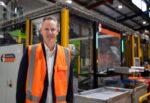The only way is up: how Gallagher Security’s vertically integrated manufacturing model delivers
Global security manufacturer, Gallagher Security has a proud history of delivering its solutions to the world with uninterrupted movement and the assurance they can ship 95% of purchase orders the next day, worldwide. On the eve of World Manufacturing Day on October 4, Gallagher, a frequent award-winner for its manufacturing prowess, acknowledges its vertically integrated manufacturing and engineering capabilities which are backed by more than 86 years of entrepreneurial spirit. Gallagher Security Chief Executive, Mark Junge says, “Because our solutions are designed, engineered, manufactured, and distributed from our head office site in Hamilton, New Zealand, we have complete oversight of manufacturing and distribution, ensuring we maintain quality, and can quickly and easily make changes, invest in raw materials, and implement strategies to ensure continued availability.” With control over the full supply chain, Gallagher can rapidly respond to emerging challenges resulting in shorter lead times, guaranteed quality, full visibility, and the ability to deliver on demand. Such was the case with events of recent years which hit manufacturers around the world hard. The Covid-19 pandemic and associated supply chain and shipping complications pushed Gallagher to re-engineer its products with parts they could access to ensure continued supply. It’s this ability to pivot and their commitment to relentless innovation that minimises the risk of third-party limitations and global risks to people and organisations,’ echoing their customer centric approach and putting people at the heart of everything they do. And the world is watching. In 2023 alone, Gallagher took home five manufacturing awards across Australia, the United States, and the United Kingdom at the Australian Security Industry Awards, US, and UK OSPAs (Outstanding Security Performance Award), Security and Fire Matters and Fire and Security Matters awards, respectively. Already in 2024, Gallagher has been awarded a further three Manufacturing awards at the Fire […]










